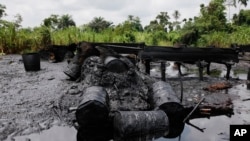Africa's largest oil producer, Nigeria, says thieves and vandals cost the country up to 200,000 barrels of oil per day - that's billions of dollars in lost revenue. To combat the problem, Nigerian oil authorities have launched a mobile app for reporting the incidents and rewarding those who do.
The launch of the crude oil theft monitoring app took place last Friday in Abuja, during the signing of renewed production contracts between the Nigeria National Petroleum Commission and its oil drilling partners.
Authorities said the mobile platform was created for members of host communities in oil-rich regions to enable early reporting of incidents and spur immediate action from relevant security and government authorities.
Whistleblowers will also be rewarded.
During the launch, the NNPC group head Mele Kyari admitted that pipeline vandalism has become difficult to control.
In July, Nigeria changed its oil firm from a solely state-run entity to a commercial oil company.
Emmanuel Afimia, the founder of Abuja-based energy consulting firm, said addressing oil theft is an important issue the new company must deal with to improve its earnings.
"At this point, NNPC would be able to at least find solutions to the issue of subsidies, to the issue of inefficiencies, to the issue of loss every year,” he said. “Because the effect would actually be felt by them, so I'm not sure they would want to continue with the way they've actually been operating the corporation. So this is definitely the right step in the right direction."
According to the NNPC, with losses at 200,000 barrels of crude oil a day Nigeria loses about $4 billion in revenue every year.
Kyari said so far this year, the country has already lost $1.5 billion due to escalation of pipeline vandalism and oil theft at the Bonny Terminal in Rivers State.
But Toyin Akinosho, publisher of the Africa Oil+Gas Report, said beyond launching an app, political will is needed to address the problem.
"It's very important that the state hydrocarbon company itself is announcing this [but] it's not just a question about tracking, it's actually how you deliver on ensuring that those incidents don't happen again,” he said. “There has to be the will power to deliver. That's what I'm interested in.”
Nigeria has been seeking to cash in on rising energy prices as Europe tries to wean itself off Russia's energy supply following the country’s invasion of Ukraine.
Authorities have revived decades-old “Trans Saharan” pipeline projects from Nigeria to Algeria and also from Nigeria to Morocco. Both projects are targeting European energy markets.
But Akinosho said the projects may not be completed until a few years from now.
"Whatever it is that we're even building will take a bit of time,” he said. “You can't construct these pipelines that the government is talking about, you can't deliver them in less than three, four years.”
In January of this year authorities in Nigeria's oil rich Rivers State began cracking down on illegal refineries locally known as “Kpo-fire.” Many operators were arrested.
Authorities say the government's oil and gas revenue target this year is now threatened by a production shortfall of 28 million barrels caused by oil theft between January and July.




